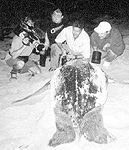
Alumni Couple Collaborates on Award Winning Films
 |
By Karen Louden Allanach Laurinaitis, an associate
producer with National Geographic Television, received her M.A.I.S. in
1998. She says the M.A.I.S. provided a unique opportunity to combine her
interests in biology, geography, and film. "The program enabled me to
move into the field of filmmaking." She pursued the degree in an effort
to make the transition from photo editor to filmmaker. "I was really impressed
with the level of education I received in my master's program," Laurinaitis
says. "I found it quite challenging and rewarding."
Drake, currently a doctoral
student in the Graduate School of Education, received his master's degree
in education in 1995. "Speaking as an adult student, the university and
faculty have reached out and showed a lot of interest in me," Drake says.
"I've had the opportunity to work with some of the most talented educators,"
he added.
Drake is currently an instructional
technologist and faculty development specialist in George Mason's Instructional
Resource Center, working with faculty members to help them integrate information
technology into their teaching.
The couple met 14 years ago
while working for a production company in Washington, D.C. Since then,
they have produced 15 documentary-based projects for various clients,
including the Smithsonian, Library of Congress, Environmental Protection
Agency, and the Washington Redskins.
Laurinaitis's master's thesis
film, Vanishing Sea Turtles of Baha, took the duo on a two-week seacoast
expedition with scientists to investigate the livelihood of the endangered
sea turtle. "We don't know what happens when a species disappears," Drake
says. "It's important to understand these animals." "We had very challenging
conditions," Laurinaitis says. Drake contracted dysentery, the group had
no running water or electricity during the hot August trip in 1997, and
not a turtle was sighted until the second week of filming. "Things fell
into place the second week we were there," she says. "Jerry did some really
incredible videography."
The trip paid off, as an edited
version of her thesis was aired on National Geographic Television in June
1998 and has been rebroadcast several times since. The video also won
a CINE (Council of International Nontheatrical Events) award and an award
from the International Columbus Film and Video Festival.
"We've been very fortunate
in our travels," Drake says. "It's a profession that requires you to always
be in a 'heads-up' mode," he says. "In the field, you don't want to be
too intrusive into the lives of your subjects. The trick is to constantly
be scanning to see what's going on. You have to be 'hyperaware,' because
you just get one chance to get it on tape."
The couple explains that any
single documentary could take a year to 18 months to develop from idea
to finished project. "You give up your weekends, evenings, and annual
leave to do shoots," Laurinaitis says.
Drake, along with Rita Ailinger,
a professor in George Mason's College of Nursing and Health Science, was
named a 1999 Media Award winner by Sigma Theta Tau International, a society
dedicated to improving nursing scholarship. The documentary Common People,
Uncommon Lives resulted from a 10-day trip to Managua, Nicaragua, in January
1999. The video detailed a group of nursing students traveling to Managua
as part of the community health nursing experience.
"Working with those students
and Rita made me proud to be a part of this university," Drake says. For
the trip, students spend two weeks in an impoverished settlement in Nicaragua
and make home visits to offer medical help to assigned families. The video
shows the challenges, such as language barriers and lack of supplies,
as well as opportunities faced by the students, including teaching new
mothers how to care for their babies.
"We were in some of the poorest
neighborhoods, and the conditions are very sad, but the people have a
lot of pride," Drake says. "It was a real eye opener." While thinking
ahead to the next big project, Laurinaitis and Drake never forget that
it was their education that helped launch their careers in the right direction.
"There are many paths to the
field," he says. "But your chances are better with a formal education
to get you started," she adds.
Jerry Drake and Maya Laurinaitis are not only George Mason alumni but also
a married couple and an award-winning filmmaking team. Projects have taken
them to many locations, from remote islands and developing countries to
football stadiums and museums.

|